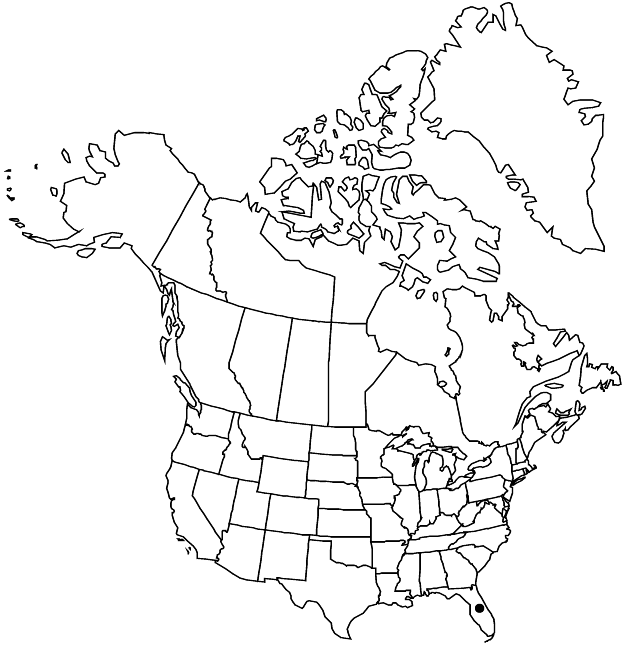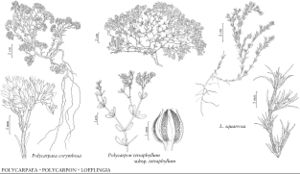Difference between revisions of "Polycarpaea corymbosa"
in J. Lamarck and J. Poiret, Tabl. Encycl. 2: 129. 1797.
FNA>Volume Importer |
imported>Volume Importer |
||
| (5 intermediate revisions by one other user not shown) | |||
| Line 1: | Line 1: | ||
{{Treatment/ID | {{Treatment/ID | ||
|accepted_name=Polycarpaea corymbosa | |accepted_name=Polycarpaea corymbosa | ||
| − | |accepted_authority=(Linnaeus) Lamarck | + | |accepted_authority=(Linnaeus) Lamarck |
|publications={{Treatment/Publication | |publications={{Treatment/Publication | ||
|title=in J. Lamarck and J. Poiret, Tabl. Encycl. | |title=in J. Lamarck and J. Poiret, Tabl. Encycl. | ||
| Line 7: | Line 7: | ||
|year=1797 | |year=1797 | ||
}} | }} | ||
| − | |basionyms={{Treatment/ID/ | + | |special_status={{Treatment/ID/Special_status |
| + | |code=I | ||
| + | |label=Introduced | ||
| + | }}{{Treatment/ID/Special_status | ||
| + | |code=F | ||
| + | |label=Illustrated | ||
| + | }} | ||
| + | |basionyms={{Treatment/ID/Basionym | ||
|name=Achyranthes corymbosa | |name=Achyranthes corymbosa | ||
|authority=Linnaeus | |authority=Linnaeus | ||
| + | |rank=species | ||
| + | |publication_title=Sp. Pl. | ||
| + | |publication_place=1: 205. 1753 | ||
}} | }} | ||
|synonyms={{Treatment/ID/Synonym | |synonyms={{Treatment/ID/Synonym | ||
|name=Polycarpaea nebulosa | |name=Polycarpaea nebulosa | ||
|authority=Lakela | |authority=Lakela | ||
| + | |rank=species | ||
}} | }} | ||
|hierarchy=Caryophyllaceae;Caryophyllaceae subfam. Polycarpoideae;Polycarpaea;Polycarpaea corymbosa | |hierarchy=Caryophyllaceae;Caryophyllaceae subfam. Polycarpoideae;Polycarpaea;Polycarpaea corymbosa | ||
| Line 29: | Line 40: | ||
|elevation=10 m | |elevation=10 m | ||
|distribution=Fla.;South America;Asia;Africa;Australia. | |distribution=Fla.;South America;Asia;Africa;Australia. | ||
| − | |discussion=<p>Polycarpaea corymbosa was first found in the sandhills of Tampa, Florida, in 1960 by O. Lakela (1962, 1963). Although she eventually described her plants as a new species, subsequent authors have concluded that the features supposedly distinguishing it lie within the range of P. corymbosa, a widely distributed paleotropical taxon. It is now known from five counties in central Florida.</p><!-- | + | |introduced=true |
| − | --><p>Polycarpaea corymbosa is morphologically diverse, especially in Africa. While at least five varieties have been described (four since 1975) for distinctive populations in Asia and South America, a thorough study across the range of the species is yet to be undertaken.</p><!-- | + | |discussion=<p><i>Polycarpaea corymbosa</i> was first found in the sandhills of Tampa, Florida, in 1960 by O. Lakela (1962, 1963). Although she eventually described her plants as a new species, subsequent authors have concluded that the features supposedly distinguishing it lie within the range of <i>P. corymbosa</i>, a widely distributed paleotropical taxon. It is now known from five counties in central Florida.</p><!-- |
| − | --><p>K. R. Beena et al. (2000) demonstrated the presence of endophytic fungi in Polycarpaea corymbosa.</p> | + | --><p><i>Polycarpaea corymbosa</i> is morphologically diverse, especially in Africa. While at least five varieties have been described (four since 1975) for distinctive populations in Asia and South America, a thorough study across the range of the species is yet to be undertaken.</p><!-- |
| + | --><p>K. R. Beena et al. (2000) demonstrated the presence of endophytic fungi in <i>Polycarpaea corymbosa</i>.</p> | ||
|tables= | |tables= | ||
|references= | |references= | ||
| Line 40: | Line 52: | ||
-->{{#Taxon: | -->{{#Taxon: | ||
name=Polycarpaea corymbosa | name=Polycarpaea corymbosa | ||
| − | + | |authority=(Linnaeus) Lamarck | |
| − | |authority=(Linnaeus) Lamarck | ||
|rank=species | |rank=species | ||
|parent rank=genus | |parent rank=genus | ||
| Line 55: | Line 66: | ||
|publication title=in J. Lamarck and J. Poiret, Tabl. Encycl. | |publication title=in J. Lamarck and J. Poiret, Tabl. Encycl. | ||
|publication year=1797 | |publication year=1797 | ||
| − | |special status= | + | |special status=Introduced;Illustrated |
| − | |source xml=https:// | + | |source xml=https://bitbucket.org/aafc-mbb/fna-data-curation/src/2e0870ddd59836b60bcf96646a41e87ea5a5943a/coarse_grained_fna_xml/V5/V5_40.xml |
|subfamily=Caryophyllaceae subfam. Polycarpoideae | |subfamily=Caryophyllaceae subfam. Polycarpoideae | ||
|genus=Polycarpaea | |genus=Polycarpaea | ||
Latest revision as of 22:10, 5 November 2020
Stems 6–18 cm, ± pilose. Leaves dimorphic; basal (sometimes absent in older specimens) with petiole 2.5–4 mm, blade oblong-ovate to suborbiculate, 8–12 mm, margins flat, glabrous; cauline subtending fascicles of usually smaller leaves, blade linear, 1–2.5 cm, margins revolute, glabrous or ciliate. Cymes dense. Pedicels 0.8–3 mm. Flowers: sepals 2.2–3.1 mm; petals marcescent, elliptic to ovate, 0.7–1 mm; stigmas nearly sessile. Capsules 1.5 mm. Seeds 0.4–0.5 mm. 2n = 36.
Phenology: Flowering summer–winter.
Habitat: Sandhills, grassy areas, disturbed sites
Elevation: 10 m
Distribution

Introduced; Fla., South America, Asia, Africa, Australia.
Discussion
Polycarpaea corymbosa was first found in the sandhills of Tampa, Florida, in 1960 by O. Lakela (1962, 1963). Although she eventually described her plants as a new species, subsequent authors have concluded that the features supposedly distinguishing it lie within the range of P. corymbosa, a widely distributed paleotropical taxon. It is now known from five counties in central Florida.
Polycarpaea corymbosa is morphologically diverse, especially in Africa. While at least five varieties have been described (four since 1975) for distinctive populations in Asia and South America, a thorough study across the range of the species is yet to be undertaken.
K. R. Beena et al. (2000) demonstrated the presence of endophytic fungi in Polycarpaea corymbosa.
Selected References
None.
